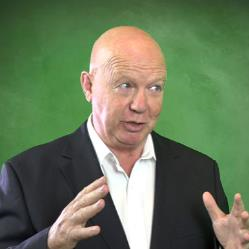 "Lead the customer to a realization" - interview by John Smibert.
"Lead the customer to a realization" - interview by John Smibert.
According to Dean Kelly salespeople need to change the conversion. In this discussion I asked him what he meant.
 He said "traditionally salespeople turn up and talk about themselves or their product, so "change the conversation" is flipping that on its head and making the entire conversation focused on the client.
He said "traditionally salespeople turn up and talk about themselves or their product, so "change the conversation" is flipping that on its head and making the entire conversation focused on the client.
Dean suggested two objectives in the sales meeting. "Number one, to help the client understand that we have some solution understanding or some business understanding of problems they are facing, and secondly, at the end of that conversation, that we are equipped with the capability to help them solve that".
We need to do this "not by throwing that information at them; it's more by having a conversation where you can lead them to that realization".
See the full interview to learn more. This interview is likely to be valuable for sales managers, sales leaders and the CEO, COO and CSO and salespeople.
Dean Kelly is the Sales Deal Mechanic.
Interview
John: Welcome back! I'm delighted to have Dean Kelly with me, the 'Deal Mechanic'! Hi, Dean!
Dean: Thank you very much for having me again, John!
John: Look Dean, it's great to have you back and there's some things I really wanted to drill down on our previous conversations. One is that you used the words a lot "change the conversation", and I know a lot of people talk about challenging and so on and so forth. What do you mean? What's the philosophy behind "change the conversation" for you?
Dean: Philosophically and traditionally, salespeople turn up and talk about themselves or their product, so to me "change the conversation" is flipping that on its head and making the entire conversation focused on the client, with two objectives in that meeting. Number one, to help the client understand that we have some solution understanding or some business understanding of problems they are facing, and secondly, at the end of that conversation, that we are equipped with the capability to help them solve that. So if you want to do that successfully, it's not by throwing that information at them; it's more by having a conversation where you can lead them to that realisation. So effectively changing the conversation is about focusing on the client, have a conversation that's client centric, and helping them understand that we can help them solve a problem that they have today.
John: Now, a lot of us talk about that, "Selling is not telling, selling is listening," all that sort of stuff. Are you talking about that from a philosophical point of view?
Dean: Not only philosophically. At the same time, it's taking the philosophy into action and actually doing it with a client. There's talking the talk and then there's walking the walk, so it's about both things, understanding it and knowing the internal conversation we have to have, with my manager or my manager's conversation with me that is going to gear me up to have the appropriate sales conversation or change the customer conversation, and then there's me in front of the client, having the appropriate conversation. So there's both sides to it.
 John: You use the word "change", you're saying "change the conversation".
John: You use the word "change", you're saying "change the conversation".
Dean: Yes.
John: So the word "change" from your point of view is changing the way we talk with the customer. I see it as something where we can help the customer through a thought process.
Dean: Yes. It's helping the customer through a thought process, it's helping the customer understand that we have value and maybe have solved these problems previously...
John: So you might want to take the customer down a particular path in their thinking?
Dean: There may be some of that, there may be even just helping them understand some of the pitfalls of the way they're thinking, or how they can avoid various challenges that are out there in the marketplace, or with solutions and solving those solutions in various ways.
John: You mentioned pitfalls in the way they're thinking, but before you do that you have to find out what they are thinking.
Dean: Correct, how they're thinking - yes, exactly. And what kind of solutions they're looking at and how important is the problem. Again, it's coming back... One of the big pieces of information out at the moment is that around 50% of deals that are forecast to close often are lost to do nothing.
 John: Right.
John: Right.
Dean: Now, that problem at the end is actually a symptom of a problem at the beginning, which is poor qualification. So the objective behind changing the conversation is to help the salesperson better qualify the opportunity with their client.
John: Determine whether there's enough value for the customer and whether it's going to be compelling enough for them to do something about it.
Dean: And being fully prepared to walk away if there's not, thank the client and say, "I really don't think we can help you here."
John: Yes. And in doing so we still have created some value for the customer so the door's open the next time...
Dean: To come back in, absolutely.
John: Okay. So that's "change the conversation", that's the philosophy if you like, change the conversation. What I'd like to do is spend some time talking about how you do that. Would you come back and have another chat?
Dean: I certainly would.
John: Look forward to it, Dean!
Dean: Thank you, John!
****************
More of Dean Kelly:
****************

Your Invitation: I invite you to join the Sales Leader Forum group on LinkedIn where you can experience informative discussions with your peers and sales thought leaders on subjects like the one we have discussed here. I also invite you to subscribe to the
- Sales Leader Resource Centre here
- Sales Leader YouTube channel here (300+ sales leadership videos)
Please Share: If you valued this article, please share via your Twitter, LinkedIn, Google+ and Facebook social media platforms. I encourage you to join the conversation or ask questions. So feel free to add a comment on this post - I promise to respond. If inclined please follow my LinkedIn post page here.
Want to touch base? If you have questions please feel free to contact me - email: john.smibert(at)salesleaderforums.com, Phone: +61 404857893 or Skype: john.smibert